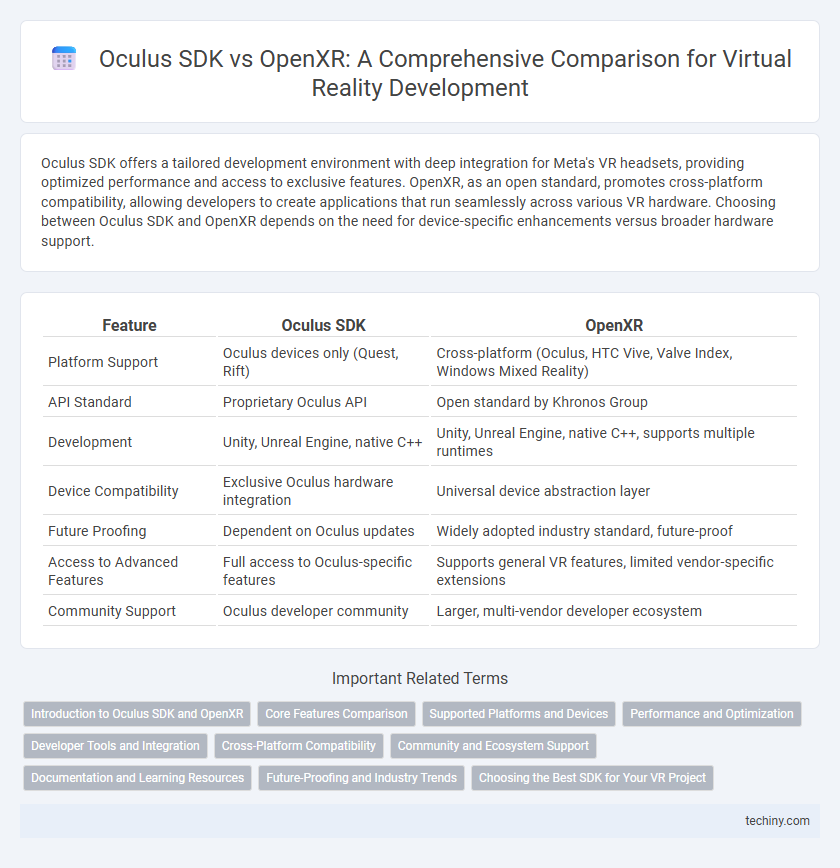Oculus SDK offers a tailored development environment with deep integration for Meta's VR headsets, providing optimized performance and access to exclusive features. OpenXR, as an open standard, promotes cross-platform compatibility, allowing developers to create applications that run seamlessly across various VR hardware. Choosing between Oculus SDK and OpenXR depends on the need for device-specific enhancements versus broader hardware support.
Table of Comparison
| Feature | Oculus SDK | OpenXR |
|---|---|---|
| Platform Support | Oculus devices only (Quest, Rift) | Cross-platform (Oculus, HTC Vive, Valve Index, Windows Mixed Reality) |
| API Standard | Proprietary Oculus API | Open standard by Khronos Group |
| Development | Unity, Unreal Engine, native C++ | Unity, Unreal Engine, native C++, supports multiple runtimes |
| Device Compatibility | Exclusive Oculus hardware integration | Universal device abstraction layer |
| Future Proofing | Dependent on Oculus updates | Widely adopted industry standard, future-proof |
| Access to Advanced Features | Full access to Oculus-specific features | Supports general VR features, limited vendor-specific extensions |
| Community Support | Oculus developer community | Larger, multi-vendor developer ecosystem |
Introduction to Oculus SDK and OpenXR
Oculus SDK offers a comprehensive set of tools and APIs designed specifically for developing immersive applications on Oculus VR devices, optimizing performance and user experience within the Oculus ecosystem. OpenXR, managed by the Khronos Group, provides a standardized, cross-platform API that enables developers to create VR and AR applications compatible with multiple hardware and software platforms. Comparing these frameworks highlights Oculus SDK's device-specific optimizations versus OpenXR's flexibility and broader compatibility across various VR headsets.
Core Features Comparison
Oculus SDK offers a comprehensive suite of tools optimized specifically for Oculus devices, including advanced hand tracking, optimized rendering pipelines, and built-in support for social VR features. OpenXR provides a standardized API designed for cross-platform compatibility, enabling developers to write code once and deploy across multiple VR hardware with unified input and interaction models. While Oculus SDK delivers device-specific performance enhancements, OpenXR emphasizes broad hardware interoperability and future-proofing through industry-wide adoption.
Supported Platforms and Devices
The Oculus SDK primarily supports Meta's Oculus Quest and Rift devices, offering deep integration tailored for these platforms with optimized performance and exclusive features. OpenXR, endorsed by the Khronos Group, provides a standardized API compatible with a broad range of VR hardware, including Meta Quest, HTC Vive, Valve Index, and Windows Mixed Reality headsets, enabling cross-platform development and device interoperability. Developers aiming for wide device compatibility and future-proof applications often prefer OpenXR for its extensive platform support compared to the Oculus SDK's device-specific focus.
Performance and Optimization
Oculus SDK offers deep integration with Oculus hardware, enabling highly optimized performance through direct access to proprietary features and low-level APIs. OpenXR provides a unified, cross-platform interface that simplifies development but may introduce slight overhead compared to the specialized optimizations of Oculus SDK. Developers prioritizing maximum frame rates and minimal latency often prefer Oculus SDK on Oculus devices, while OpenXR balances performance with broader hardware compatibility.
Developer Tools and Integration
Oculus SDK offers specialized developer tools optimized for Oculus hardware with features like hand tracking and social platform integration, providing deep system-specific functionality. OpenXR provides a standardized, cross-platform API that enables developers to build VR applications compatible with multiple devices, simplifying integration and future-proofing projects. Developers benefit from Oculus SDK's device-specific optimizations while leveraging OpenXR's broad ecosystem support for seamless cross-hardware deployment.
Cross-Platform Compatibility
Oculus SDK offers deep integration and optimized performance specifically for Oculus hardware, but its cross-platform compatibility is limited to Oculus devices. OpenXR provides a standardized API designed to support a wide range of VR headsets and platforms, enabling developers to create applications that run seamlessly across multiple hardware ecosystems. Prioritizing OpenXR enhances scalability and future-proofs VR projects through extensive device interoperability.
Community and Ecosystem Support
Oculus SDK offers a robust community with extensive developer resources and dedicated forums backed by Meta, fostering rapid innovation in VR applications. OpenXR, managed by the Khronos Group, benefits from broad industry support, enabling cross-platform compatibility and encouraging collaboration among diverse hardware and software vendors. The OpenXR ecosystem's open standard approach attracts a wider developer base, promoting interoperability and long-term sustainability in virtual reality development.
Documentation and Learning Resources
Oculus SDK offers extensive documentation tailored specifically for Oculus hardware, providing detailed guides and examples to streamline development for Oculus devices. OpenXR features a unified, cross-platform specification with comprehensive documentation designed to support a broad range of VR hardware, promoting compatibility and long-term scalability. Developers seeking in-depth, device-focused resources might prefer Oculus SDK, while those prioritizing flexibility and industry standards benefit more from OpenXR's inclusive learning materials.
Future-Proofing and Industry Trends
OpenXR offers a future-proof solution by providing a standardized, cross-platform API supported by major industry players, ensuring broad device compatibility and reducing development fragmentation. Oculus SDK, while optimized for Meta hardware, limits scalability to a single ecosystem and risks obsolescence as the industry shifts towards open standards. Adopting OpenXR aligns with emerging VR trends emphasizing interoperability, longevity, and streamlined development workflows across diverse virtual environments.
Choosing the Best SDK for Your VR Project
Oculus SDK offers deep integration with Oculus hardware, providing optimized performance and access to proprietary features like hand tracking and Passthrough API, making it ideal for projects targeting Meta devices. OpenXR, maintained by the Khronos Group, ensures cross-platform compatibility across various VR headsets and systems, promoting future-proof development and broader market reach. Selecting the best SDK depends on project goals: prioritize Oculus SDK for device-specific enhancements or OpenXR for versatility and scalability across multiple VR platforms.
Oculus SDK vs OpenXR Infographic

 techiny.com
techiny.com